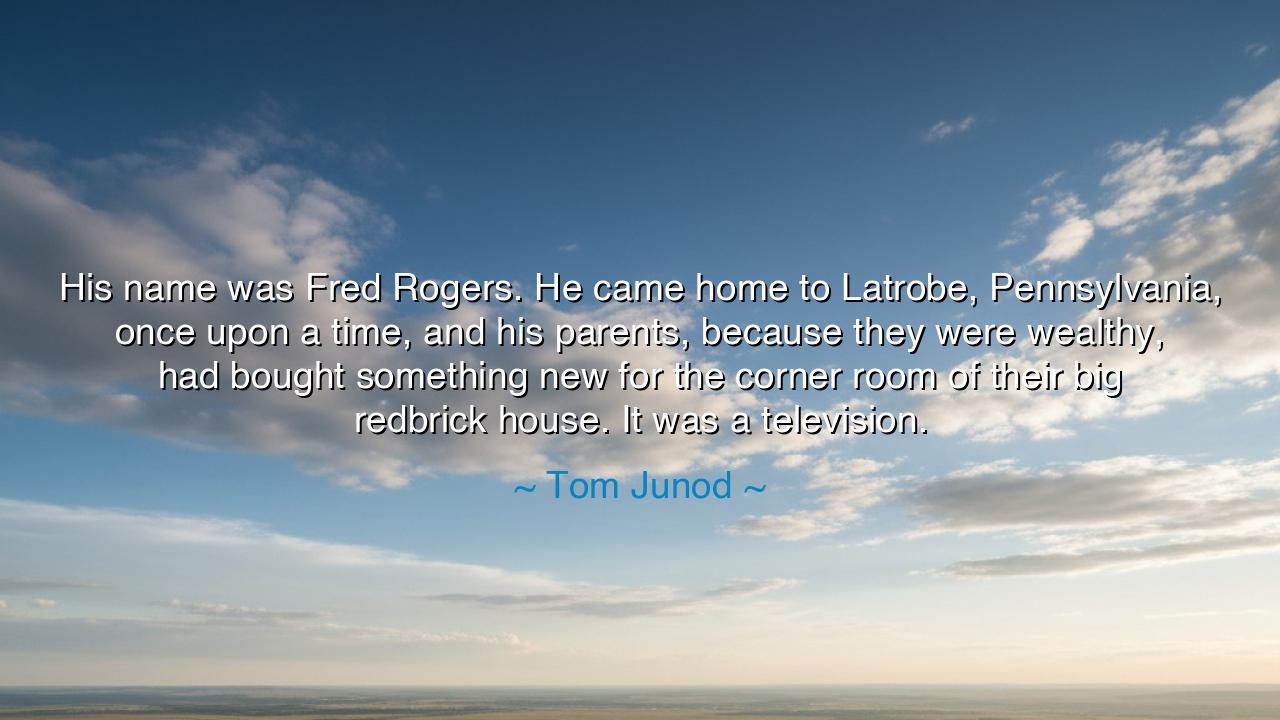
His name was Fred Rogers. He came home to Latrobe, Pennsylvania
His name was Fred Rogers. He came home to Latrobe, Pennsylvania, once upon a time, and his parents, because they were wealthy, had bought something new for the corner room of their big redbrick house. It was a television.






Hear now the tender words of Tom Junod, who wrote: “His name was Fred Rogers. He came home to Latrobe, Pennsylvania, once upon a time, and his parents, because they were wealthy, had bought something new for the corner room of their big redbrick house. It was a television.” Though simple in phrasing, these words carry the weight of quiet destiny. They speak not merely of a boy and a new invention, but of the birth of a calling—a moment when technology and tenderness would one day meet through the soul of a man who chose to make light, not noise, from the screen that now filled his family’s home. In that corner room of Latrobe, the seed of kindness in a technological age was planted.
The origin of this saying lies in Junod’s profound essay, “Can You Say... Hero?”—his 1998 reflection on the life and spirit of Fred Rogers, the beloved creator of Mister Rogers’ Neighborhood. Junod sought to uncover not the legend, but the human being behind the gentle cardigan and soft voice. In this passage, he evokes the image of a young Fred Rogers, returning home to a world newly illuminated by television—a device that would one day become both his medium and his mission. Junod’s poetic phrasing turns this memory into something sacred: the first meeting between a child of empathy and a machine that would reshape the hearts of generations.
To understand the meaning of this moment, one must see the symbolism beneath it. The television, born in the twentieth century, was a marvel of progress but also a vessel of power—capable of informing or deceiving, uplifting or corrupting. Many saw it only as a novelty or an escape. But Rogers, even as a boy, saw something more. When he later found the airwaves filled with cruelty and mockery, he decided to reclaim this instrument for goodness, to turn technology into a tool for love, understanding, and imagination. Thus, Junod’s description is not only historical—it is mythic. It captures the instant when destiny quietly knocked upon the door of an innocent heart.
This moment recalls the ancient stories of those who found their purpose through symbols of their time. When Moses stood before the burning bush, it was not the fire itself that mattered, but what it revealed—the divine call to lead his people toward freedom. Likewise, when Fred Rogers first beheld the flickering screen, he did not see entertainment; he saw potential. The television, like fire, could burn or illuminate, destroy or warm. He chose to make it a hearth—a gathering place for empathy, where children could feel safe, understood, and cherished. From that simple act of transformation, a new form of ministry was born: a ministry through media, where compassion would travel on waves of sound and light.
Junod’s words remind us, too, of the paradox of privilege and purpose. He writes that Rogers’ parents “because they were wealthy, had bought something new.” In this, we glimpse an ancient truth: that wealth and comfort alone do not define worth—it is what one does with them that matters. Fred Rogers did not inherit his kindness from luxury; he chose it in defiance of luxury. Many born into comfort turn inward, but Rogers turned outward, using his privilege not to elevate himself, but to serve others, especially the smallest and most forgotten. The television he could have used for pleasure became instead a bridge of compassion between his heart and the hearts of millions.
The story of Rogers is a parable for all ages. It teaches that even the most ordinary objects—when met by a soul of integrity—can become instruments of transformation. What was once merely a device of distraction became, in his hands, a sanctuary for learning and kindness. He taught that love and empathy, not spectacle, were the truest forms of power. Like the philosophers of old who turned words into wisdom, Rogers turned technology into tenderness, showing that progress without heart is hollow, but progress guided by conscience can heal the world.
So, children of the future, let this teaching dwell within you: every age brings forth its new inventions, its glowing screens, its marvels of science and art. But these things are neither good nor evil—they await the character of those who wield them. Be as Fred Rogers was. When you encounter the tools of your generation, use them not to boast, but to build; not to divide, but to connect. The world does not need louder voices—it needs gentler ones, filled with sincerity and care.
For as Tom Junod reminds us in his quiet remembrance, greatness often begins not in the clamor of achievement, but in the stillness of a moment—a young boy, a new invention, and a choice that would echo through the hearts of humanity. The television may have been made of wires and glass, but in Rogers’ hands, it became a mirror of the soul, reflecting what is best and most enduring in us all: the simple, eternal power of kindness.






AAdministratorAdministrator
Welcome, honored guests. Please leave a comment, we will respond soon